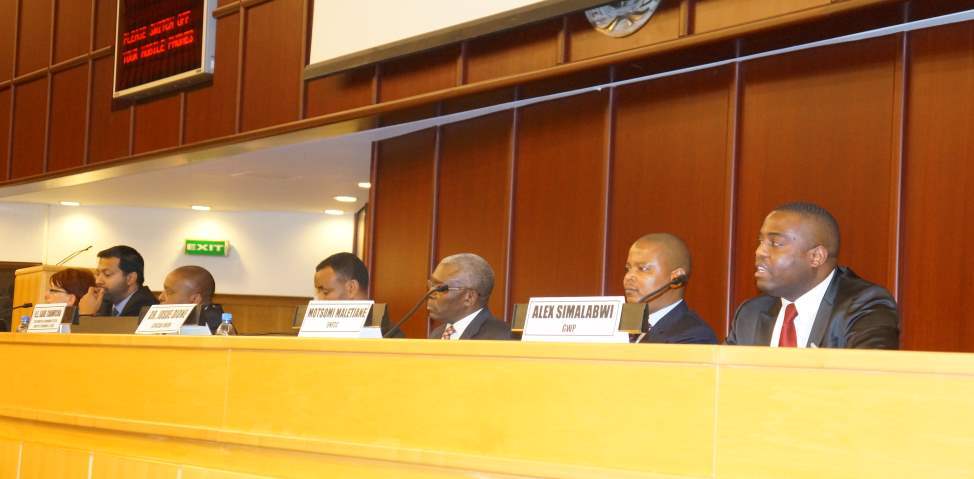A meeting of 15 English-speaking African LDCs will be held from 14-17 April 2014, followed closely by a meeting of 19 French-speaking African LDCs from 21-24 April 2014, at the United Nations Conference Centre (UNCC) in Addis Ababa, Ethiopia.
The opening ceremony of the NAPs’ Regional Workshop for English-speaking African LDCs was opened on Monday 14 April 2014, Addis Ababa-Ethiopia, and chaired by H.E. Ato Kare Chawicha, State Minister of Environment and Forest – Government of Ethiopia. H.E. Ato Kare Chawicha emphasized that Climate change will make the challenge of development more complicated. He also stressed that climate change adaptation is a key priority for LDCs. H.E. Ato Kare Chawicha mentioned that exchange of information and experiences among LDCs and with others (developing and developed) is crucial and noted that “the Challenge of Climate change must unite us all”. Therefore, he encouraged country delegates to share experience and knowledge from other countries and also from other participants from the regions and globally. H.E. Ato Kare Chawicha ended in acknowledging the role of the LEG and other NAP-GSP partners and ended by officially opening the African Regional Training.
This opening ceremony started with Ms. Ermira Fida, UNEP who gave an overview of the processes related to the National Adaptation Plan-Global Support Programme (NAP-GSP), including progress so far. Ms. Ermira Fida recognised the important collaboration for NAP-GSP both within and outside of the UN.
Mr. Pradeep Kurukulasuriya, UNDP underscored the importance of integrating the NAP processes with other national level processes and made clear that NAP-GSP will provide support based on priority needs of countries and based also on the countries’ request for support. Mr. Pradeep Kurukulasuriya said that these meetings will support countries to gain a better understanding of the technical issues, strategies, steps, tools and options presented in the National Adaptation Plan process.
Mr. Alex Simalabwi, GWP gave an overview of the efforts of GWP to support the integration of water security and climate resilience issues into national planning and decision-making processes under the Water, Climate and Development Programme (WACDEP) of the African Union and AMCOW. Mr. Simalabwi called for more partnerships among all as adaptation is a cross-cutting issue which needs to involve all sectors. He highlighted the importance of communication, especially with policy makers, to convince them why there is a need to invest in climate change adaptation.
Mr. Motsomi Maletjane, UNFCCC expressed that UNFCCC is happy to be part of the NAP-GSP as it is interested in supporting countries to implement the Convention and its protocol. Mr. Maletjane underscored the need for a paradigm shift on how we do business for climate change adaptation.
Mr. Batu Uprety, LEG initiated with highlighting that NAP is a country-owned and country-led process based on national priorities. He emphasized that the Least Developed Country Expert Group (LEG) have prepared technical guidelines for the NAP process, and different platforms have been developed to provide support needed for countries in the NAP process, such as best practice and lesson sharing; the NAP Expo, the second one which will take place in Bonn in August 2014; and the NAP Central knowledge and information platform.
Dr. Josue Dione, African Union spoke for Ms. Rhoda Peace, Commissioner of Agriculture and Rural Economy, AUC. The Message from Ms. Peace stressed that climate change is the most serious challenge that humans are facing. Ms. Peace highlighted that adaptation to climate change is a priority and an urgent matter for Africa and AU appreciates the partnership between many organizations in the NAP-GSP. AU also appreciated the collaboration between the NAP-GSP and the AU/AMCOW programme of WACDEP, highlighting that issues of water and climate change are priorities for AU connected to the 2008 AU Heads of States’ Declaration on water and sanitation. Ms. Peace called also for and urged collaboration with other AU-processes and programmes such as NEPAD’s CAADP and the ClimDev Africa programme. On behalf of AU, Ms. Peace welcomed the initiative of the NAP-GSP and stated that the AU is fully committed to support the NAP processes in its member countries.
The NAP process aims to identify medium- and long-term climate adaptation needs and to mainstream these needs into national development planning processes and strategies. These meetings are convened by the NAP-GSP – which is coordinated by UNDP and UNEP – together with other UN partners and collaborating organisations, with support from the Least Developed Countries Fund (LDCF) of the Global Environment Facility (The GEF). The GWP – a NAP-GSP partner – is collaborating closely to support these meetings.
The NAP-GSP is assisting LDCs to identify technical, institutional and financial needs to integrate climate change adaptation into ongoing medium and long-term national planning and budgeting. Currently, 26 LDCs from Africa, Asia and the Pacific have requested support for their NAP process.
GWP's Press Release can be downloaded and UNEP/UNDP's Press Release is available on the following webpage.
